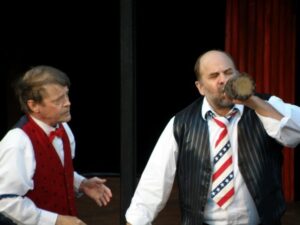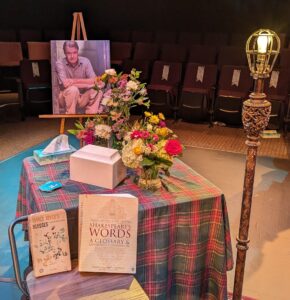Dunkirk NY – Recently, I went down a rabbit hole of theatrical news and information. I did so because the news of theatres closing and shrinking across the country was front and center this past summer, and I wanted to see if I could find out more about the causes. Down somewhere at the very depths of this particular rabbit hole, I found a Substack written by a former collaborator and theatre blogger from back in the 2000s. His name is Scott Walters, and his substack has the same name as his former blog – Theatre Ideas. I was also at that time writing my own blog entitled A Poor Player, and we started corresponding. We found we had similar interests and background, as we were both academics who had come to believe that the academic model for theatre departments was, to put it bluntly, based on a collection of myths and outright lies. We decided to collaborate on a presentation for the 2014 (I believe) Southeast Theatre Conference. Our presentation was based on facts and statistics we had collected demonstrating the statistical odds against a theatre student becoming a successful actor, and why theatre departments should pivot away from the “pre-professional” model of training and begin to develop educational models that emphasized personal empowerment for theatre artists in creating their own work and creating a smaller, sustainable career model that emphasized, not stardom, but a sustainable creative life and lifestyle. After that presentation, though, we drifted apart as I retired, and then he went on to pursue other interests until he retired as well. It has only been recently that I discovered he has begun writing again about theatre, and basically putting forward many of the same ideas we suggested in that presentation.
I mention all this because Scott has recently released an ebook entitled Building a Sustainable Theatre: How to Remove Gatekeepers and Take Control of your Artistic Career. I read it, and it made me – well, the best word I have found to describe my reaction is sad. I became sad when I realized, upon finishing reading it, that the book is 10-15 years too late. If it had come out in 2010, it would have been revolutionary. In 2023, however, the book has no relevance, not because it’s a bad book with bad ideas – far from it. It’s just that theatre, as an art form, is dying, and despite the book’s good intentions, its fundamental premises and suggestions don’t apply to the 2023 realities of theatre.
I am hoping with this series of essays (and I don’t know yet how many I will write) to explain why I think theatre is an art form on serious life support, and perhaps should have its plug pulled. I am extremely pessimistic about the short-term viability of theatre, and I have no idea at all where theatre will find itself in the long term. There is clearly an entropic spiral taking place at the moment, and the unrelenting news over this past summer detailing theatres reducing offerings and/or closing altogether was stunning in its scope. I don’t know what to say to people anymore who ask me about theatre and the state thereof, and I also don’t know what to make anymore of my career as a lifelong theatre artist.
I don’t think I am going to shed any new light here. Rather, I think this series of essays will more like a purge of thoughts, feelings, and observations about where theatre is at today. I don’t have solutions. I don’t intend to look for any. Whatever solutions lie out there will probably come to fruition after I’ve passed on. The issues in theatre are inextricably tied to the cultural climate we find ourselves in now – divided and uncertain. I can only say this for certain – my continued interest and participation in the theatre will only happen because I don’t know how to do much of anything else. I’ve been on stage since the age of 8, and I really never learned any other skills besides teaching and doing theatre. And there’s really not much more for me to pivot to at my age. What you’ll be reading will be a purging of a life spent in an art form that has lost its cultural relevance. In a sense, I think it’s time to say goodbye and godspeed. -twl





